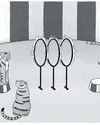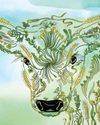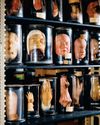
The New Yorker
COLLECTIVE PUNISHMENT
Why is Donald Trump upending America's commitment to NATO?
10+ min |
June 30, 2025

The New Yorker
NEW BOND
Amazon MGM Studios has agreed to a deal with the Broccoli family behind James Bond to take over the creative rights of the movies. ... Mike Hopkins, head of Prime Video and Amazon MGM Studios, told Bloomberg last year that while the business was careful with intellectual property, it also wanted to be creative producing new content with older brands. “So if you're gonna do things, we think you have to do it with a different angle, a different take,” he said.
2 min |
June 30, 2025

The New Yorker
BACH'S COLOSSUS
Pygmalion's visceral rendition of the B-Minor Mass.
5 min |
June 30, 2025

The New Yorker
SEX BOMB
Why Generation Z is so chaste.
10+ min |
June 30, 2025

The New Yorker
CARE AND FEEDING
Hugh has a hip operation.
10+ min |
June 30, 2025

The New Yorker
THE DOGEFATHER PART II
Who will help lead the Department of Government Efficiency now that Elon Musk has left the scene? News reports have mentioned Joe Gebbia, a Tesla board member and a co-founder of Airbnb, as a possible replacement. Gebbia is forty-three. Like Musk—his close friend—he is a billionaire, a resident of Austin, Texas, and the rumored recipient of a hair transplant. Gebbia formally announced his political conversion on X in January, posting that, after years of supporting Democrats, he finally “did [his] own research” and concluded that Donald Trump “deeply cares about our nation.” His feed has a MAHA flavor: Big Food exposés (“The truth about Ketchup”) alternate with digs at liberals suffering from “TDS,” or Trump Derangement Syndrome.
3 min |
June 30, 2025

The New Yorker
THE TALK OF THE TOWN
History doesn’t repeat itself, but it rhymes.” Whether or not Mark Twain ever really said that line, it fits and resonates loudly as President Trump shuttles between the Oval Office and the Situation Room, weighing if he should dispatch bombers on yet another American sortie to the Middle East.
6 min |
June 30, 2025

The New Yorker
PICK THREE
Jennifer Wilson on three new poetry books.
1 min |
June 30, 2025

The New Yorker
HARDCORE DEPT. PAST LIVES
A candidate meets voters wherever they can. The other day, Justin Brannan, a burly Democratic city councilman from Bay Ridge who's running to be the Party's nominee for city comptroller, surprised one constituent by opening a papered-over door at a vacant retail space in Tribeca.
3 min |
June 30, 2025

The New Yorker
WRECKAGE
“F1,” “Sorry, Baby.”
6 min |
June 30, 2025

The New Yorker
TRUTH AND BEAUTY DEPT. NEVER TELL ME THE ODDS
On the morning of the New York premiére of the new sci-fi movie “The Life of Chuck,” in which Mark Hamill plays a grizzled, alcoholic, math-loving accountant, the actor visited MoMath, the National Museum of Mathematics, near Madison Square Park. Hamill has accurately described his look in the film—white hair, walrus mustache, sweater vest—as “Geppetto.”
3 min |
June 30, 2025

The New Yorker
THE DOGEFATHER PART II
Who will help lead the Department of Government Efficiency now that Elon Musk has left the scene? News reports have mentioned Joe Gebbia, a Tesla board member and a co-founder of Airbnb, as a possible replacement. Gebbia is forty-three. Like Musk—his close friend—he is a billionaire, a resident of Austin, Texas, and the rumored recipient of a hair transplant. Gebbia formally announced his political conversion on X in January, posting that, after years of supporting Democrats, he finally “did [his] own research” and concluded that Donald Trump “deeply cares about our
9 min |
June 30, 2025

The New Yorker
SEEDS OF DOUBT
Can agricultural innovation outpace our growing appetites?
10+ min |
June 30, 2025

The New Yorker
Happy Days
Matthew is behind the curtain when the announcement comes: Ladies and gentlemen, the role of Winnie, played by Aira Wilson, will be performed at this first preview by Matthew Lim.
10+ min |
June 30, 2025

The New Yorker
TABLES FOR TWO
Samuel Clonts and Raymond Trinh, the chef duo behind Cactus Wren, which opened in February on Ludlow and Rivington Streets, seem blessedly uninterested in capturing any sort of Zeitgeist.
2 min |
June 30, 2025

The New Yorker
DEAD RECKONING
A museum of medical history asks what we owe the past.
10+ min |
June 30, 2025

The New Yorker
THE DESCENDANTS
How a spike in second-generation players is changing the N.B.A.
10+ min |
June 30, 2025

The New Yorker
WHEN TO QUIT
Haim sets off on a rampage.
7 min |
June 30, 2025

Techlife News
CHATGPT DIMS BRAIN ACTIVITY IN ESSAY WRITING, MIT STUDY FINDS
A new MIT study reveals that using ChatGPT to write essays reduces brain activity compared to writing with traditional search tools or no tools at all.
4 min |
Techlife News #712

Techlife News
APPLE FACES NEW EU SCRUTINY OVER APP STORE RESTRICTIONS
European Union regulators warned Apple on June 16, 2025, that it risks fresh antitrust charges unless it resolves violations of the Digital Markets Act, a law aimed at curbing tech giants’ dominance. The European Commission, the EU’s executive arm, set a June 26 deadline for Apple to allow app developers to inform users about cheaper payment options outside the App Store, a practice known as steering. Failure to comply could trigger daily fines up to 5% of Apple's global revenue, a significant threat given the company’s $394 billion in sales last year.
5 min |
Techlife News #712

Techlife News
WHATSAPP EMBRACES ADS, SHIFTING ITS CORE IDENTITY
Meta Platforms announced on June 16, 2025, that WhatsApp, its global messaging giant, will display ads for the first time, marking a pivotal shift for the app acquired for $19 billion in 2014.
5 min |
Techlife News #712

Techlife News
WAYMO ROBOTAXIS SPREAD ACROSS MORE CALIFORNIA CITIES
Waymo, Alphabet's self-driving car unit, is rolling out its robotaxi service to new neighborhoods in California, adding over 80 square miles to its commercial zone.
4 min |
Techlife News #712

Techlife News
MICROSOFT'S VOW TO SAFEGUARD EUROPE'S CLOUD DATA
ROOTING DATA IN EUROPE
5 min |
Techlife News #712

Techlife News
APPLE AIMS FOR SPRING 2026 SIRI AI REVAMP
Apple has set its sights on spring 2026 to roll out a major Siri overhaul, planned for the iOS 26.4 software update.
4 min |
Techlife News #712

Techlife News
MALAYSIA INVESTIGATES CHINESE FIRM'S USE OF NVIDIA AI CHIPS
Malaysia's trade ministry is digging into reports that a Chinese company is using servers equipped with Nvidia's advanced AI chips to train large language models in local data centers.
5 min |
Techlife News #712

Techlife News
GOOGLE FACES ROADBLOCK IN EU ANTITRUST FIGHT OVER ANDROID
Google suffered a major blow in its effort to overturn a massive European Union antitrust fine tied to its Android operating system.
4 min |
Techlife News #712

Techlife News
X UNVEILS XCHAT WITH ENCRYPTION AND NEW MESSAGING TOOLS
A NEW MESSAGING SYSTEM EMERGES
5 min |
Techlife News #712

Techlife News
APPLE'S BACK TO SCHOOL SALE OFFERS NEW INCENTIVES
Apple's annual Back to School sale, known as the Higher Education Offer, is underway in the United States, targeting students, educators, and parents through the Education Store.
3 min |
Techlife News #712

Techlife News
INDIA OPENS DOORS TO STARLINK'S SATELLITE INTERNET
A NEW PLAYER IN INDIA'S INTERNET MARKET
4 min |
Techlife News #712

Techlife News
AMAZON'S ROBOTAXI FACTORY AIMS TO RIVAL WAYMO
Amazon is diving into the autonomous vehicle race with a massive factory near Silicon Valley, designed to produce up to 10,000 robotaxis each year.
4 min |